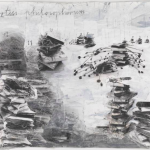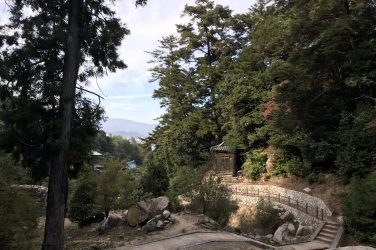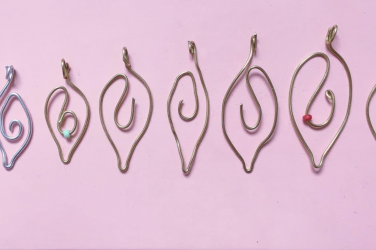After a visit to post-revolution Tunisia, Hendrik Steinort’s shares a philosophical reflection on desire, life and human nature.
‘Few will be able to guess how sad one had to be in order to resuscitate Carthage.’ [Illuminations by Walter Benjamin.]
I. ‘Ekphrasis [greek] – description of a work of art produced as a rhetorical exercise.’
A post-orientalist confession [for I dare not to represent, to speak of anyone, but myself] at a Museum in the Maghreb:
The rotten joints of an unhinged door, the oxidised bronze shield that adorns its centre – both assembled as an analytical mass that points to an ancient origin and they are caught and restrained in the vitriol of modernity. Through the translucent rectangular glass, me, the western spectator, is looking at the aforementioned object that stands in symbolic and aesthetic ways for something that has already passed away. And in looking through the glass, I am also glancing on the mirage frame of my own silhouette.
I. ‘Entelecheia [greek] – describes the fateful interaction between inborn nature and external history.’
At the beginning there were the male vegetable vendor and a civil servicewomen and an intractable relation of multiple layers of dominance and impotence between these two protagonists who involuntarily stood at the beginning of the Arab spring.
At the beginning there was a perceived injustice, denial, a slap, a grab, a multitude of voices, fire, fire for thousands of kilometres, the toppling of dictators, the crushing of societal edifices, an opening up of intersexual intersubjectivities.
III. The case of the Tunisian democracy remains a beacon of hope after a multi-country phalanx of change (the Arab Spring) was tragically crushed at its historical bottleneck position by a passive revolution of the elites. The Tunisian democracy of 2019 is an entelecheion of the real individual political aspirations, the suggested aspirations, the passive acceptance as well as the co-aspirations of a certain historico-political moment.
The case of the Tunisian democracy remains a beacon of hope after a multi-country phalanx of change (the Arab Spring) was tragically crushed at its historical bottleneck position by a passive revolution of the elites.
A societal metabolism which was nurtured by the contradictions between a wealthy minority, bestowed with prestige, political power and extra-moral access to dispositions of lust on the one side and a majority suffering from poverty, political impotence and a lack of dignity, fuelled by the unarticulated and articulated taboos of ‘intersex-subjectivity’ on the other. As dichotomies tend to focus on false extremes and hidden knowledge, we shall also acknowledge a multiplicity of counterintuitive alliances, intuitive solidarities, and neglected horizontal enmities.

IV. The symbolic representation of the successful revolution, the most obvious of these being attested by external (Western states and media) and internal (free elections) indicators that serve as consensual feedback operators, transformed the revolution into an ‘automatised normalisation’. In order to be granted access to the underbelly of opinions, to cast doubt on the status quo, a cab drive is always most informative: ‘Before revolution: One thief; after revolution: Many thieves‘. This informative drive unloads us at the verb ‘uncover’ as there seems to be more to uncover in the modern Tunisian Republic than what seems apparent by looking merely at formal criteria.
The democratic state as the meta-phenomenon of its constituents sees its symbolically informed functions classically as atomic, in the original sense – indivisible. It relies on the assumption of a stringent subject-object relation, measurable, open to analysis, without being threatened by contingencies. The state has, at its core and as its raison d’etre, a predictable and stable demos who is willing to dissent through obvious and integrated categories and channels of rage.
In order to be granted access to the underbelly of opinions, to cast doubt on the status quo, a cab drive is always most informative: ‘Before revolution: One thief; after revolution: Many thieves‘
But in our current era of ‘quantum politics’, fuelled by instantaneous, transnational access to resources of desire: money, beauty, sex, recognition and truth, the categories of physical lust and psychological desire are the forgotten champions of history. They might constitute the uncertainty principle behind the classical perceptions of the constitutive elements of political power in Tunisia. A political power that had/has to come to terms with a thymotic rage [a desire-driven thirst for appreciation] that tipped/tipps the delicate balance in Tunisia.
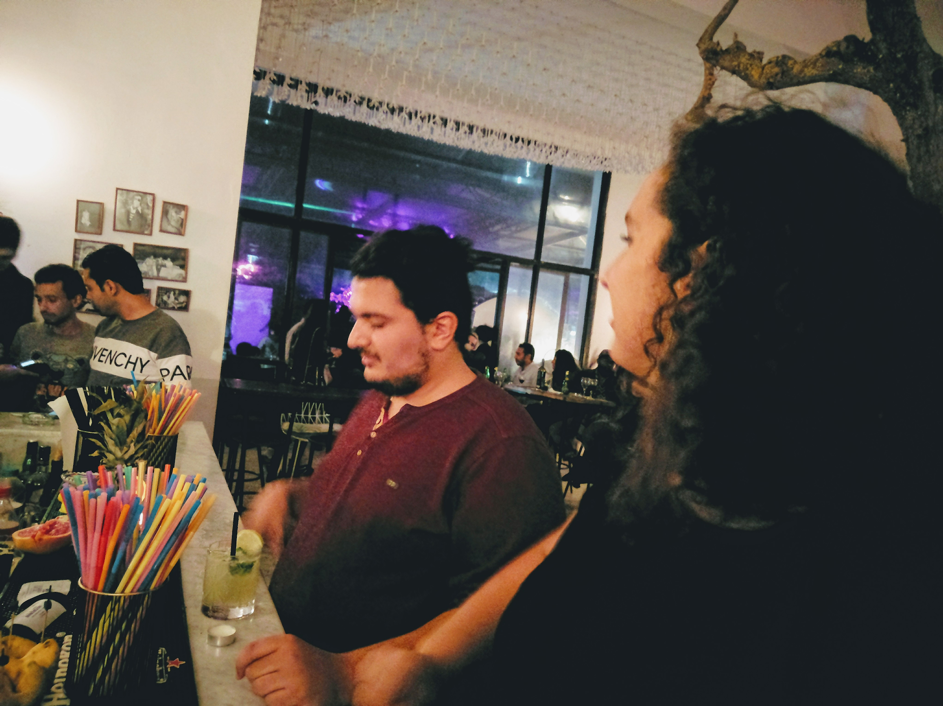
V. Already during Ben Ali’s regime, Tunis was the political capital by definition, but the real political capital of the state stems from the theological discussions in Kairouan, the judicial frames from municipal courts in Sfax, and passions derived from experiences in the buzzing clubs of Sidi Bou Said. The political capital that is argued over in every family at the dining table and which is moulded in executive terms by the police forces in Sidi Bouzid.
The intertwinement of desire as an intersubjective phenomenon and lust as a principally individual phenomenon, is pointing to a mutually reinforcing relationship at whose beginning and end, a human being stands.
The intertwinement of desire as an intersubjective phenomenon and lust as a principally individual phenomenon, is pointing to a mutually reinforcing relationship at whose beginning and end, a human being stands. A person is intractably complex and in the way in which we desire and love and laugh and smile and feel sorrow and dance and hate and stare and touch and fart, we are ‘a-kin’ and more commonly human than we are separated through any kind of political categories. Having said and believed that, it is in the following upon a tiny and non-representative faction of Tunisian women to lend us their voice in post-revolution Tunisia:
VI. ‘Protagonista’ (anonymised):
A Tunisian woman wearing a headscarf, I met her on Tinder during my travels in Tunisia. Geotechnical Engineer, believer, profile info: “A little something abt me: *To the One and ONLY question “why am I on Tinder” [One of the few ones with a headscarf, disproportionate to its demographic representation] : No expectations… just a way to refresh my social circle* I enjoy pretty much everything from nerdy stuff to soccer to music and movies…
What does post-revolution Tunisia mean for you?
[‘I think for me and for every young woman in Tunisia this period was crucial for us, as we begun to rediscover ourselves and adopt to the fact that we are more free then they used to tell us, our rights are guaranteed by the law and lately with the equality in heritage reform it proved for us that we are on the right road to democracy. I strongly believe that Tunisia is ahead of a lot of countries in women’s rights, and no woman can deny that, although when we are looking at the West, at France for example, we see that there is still a strong difference in how women and boys are allowed to behave, or just kissing on the street, why is that not normal? And Europe was and is an essential helper for Africa, Africans and especially us Tunisians, but they seem to have forgotten about us in the course of the refugee crisis.’]
A person is intractably complex and in the way in which we desire and love and laugh and smile and feel sorrow and dance and hate and stare and touch and fart, we are ‘a-kin’ and more commonly human than we are separated through any kind of political categories.
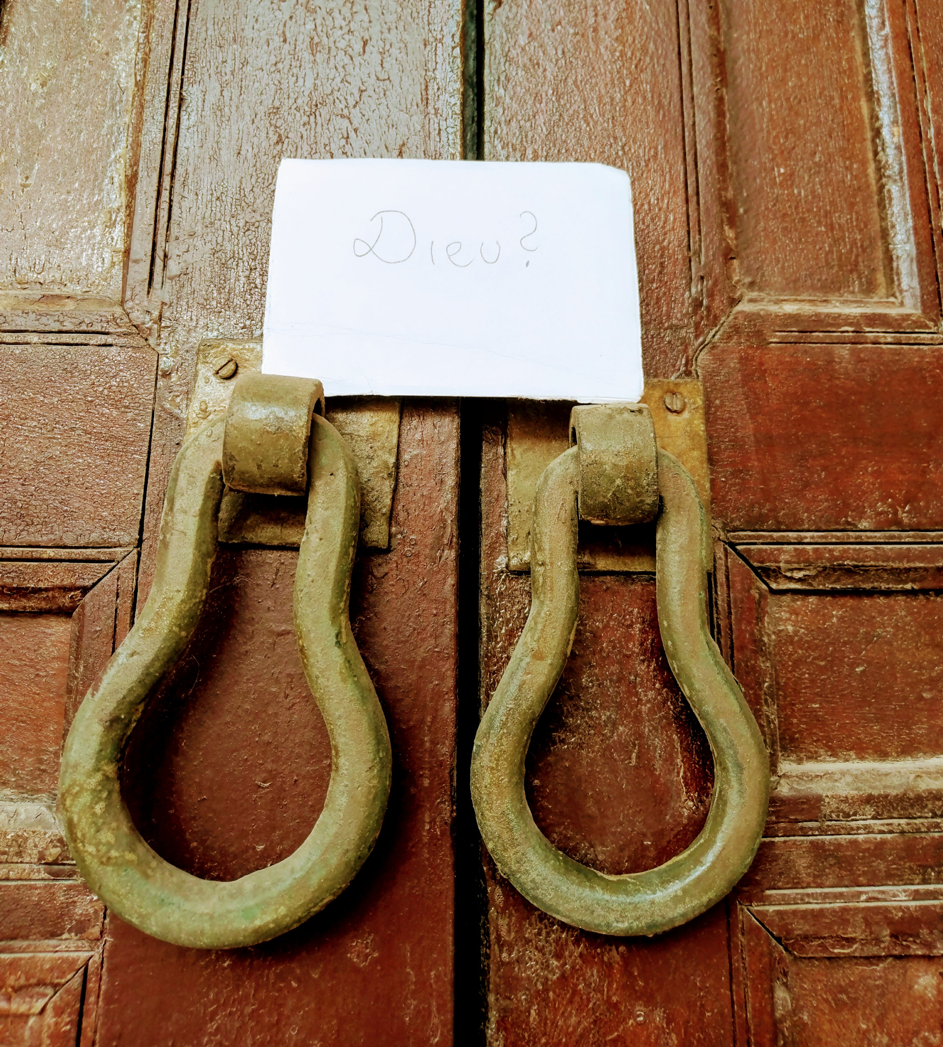
VII. What does one desire? And how can one’s existential frame of life open its possible dimensions wide enough to prepare a field on which one can – without any false pretence of shame – engage, hand in hand with the other, in a transformation of ones most secretly held imagination into a form of realised lust or satisfaction that corresponds to the possibilities of an orderly and functioning society?
This question may arise from the observations and even haunt the readers’ mind while looking at the silhouette of their very own societal arrangement. It may yield to the possibility of sensing urgency for that understanding to usher into a democratic arrangement that is more than the name and de facto sum of its institutions, an arrangement in which real human beings can encounter themselves on a clearing of authenticity.
‘Epithumia [greek for – desire] – With desire I did desire…to eat this passover with you before my suffering’ (The last supper; NT)
Cover photo: Paolo Macorig (Flickr); Licence: CC BY-NC-ND 2.0






